
The Yugoslav People's Army, also called the Yugoslav National Army, was the military of the Socialist Federal Republic of Yugoslavia and its antecedents from 1945 to 1992.
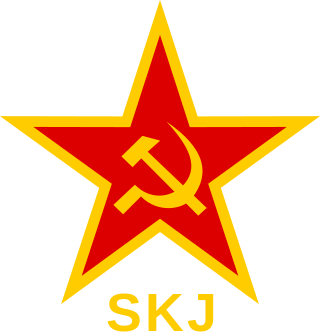
The League of Communists of Yugoslavia, known until 1952 as the Communist Party of Yugoslavia, was the founding and ruling party of SFR Yugoslavia. It was formed in 1919 as the main communist opposition party in the Kingdom of Serbs, Croats and Slovenes and after its initial successes in the elections, it was proscribed by the royal government and was at times harshly and violently suppressed. It remained an illegal underground group until World War II when, after the invasion of Yugoslavia in 1941, the military arm of the party, the Yugoslav Partisans, became embroiled in a bloody civil war and defeated the Axis powers and their local auxiliaries. After the liberation from foreign occupation in 1945, the party consolidated its power and established a one-party state, which existed until the 1990 breakup of Yugoslavia.

Veljko Vlahović was a Montenegrin politician and career army officer. He was one of the more prominent members of the Montenegrin branch of the Yugoslav Communist Party from 1935 which established the SFR Yugoslavia following World War II. He studied in Belgrade, Prague, and the Sorbonne, and finished his postgraduate studies in Moscow. He fought in the Spanish Civil War and was active in organizing the Communist Youth League of Yugoslavia (SKOJ).
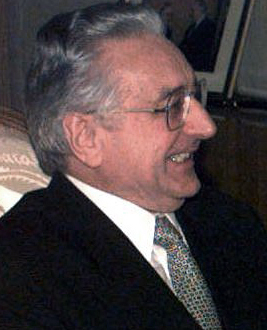
Parliamentary elections were held in the Socialist Republic of Croatia between 22 and 23 April 1990; the second round of voting occurred on 6–7 May. These were the first free, multi-party elections held in Croatia since 1938, and the first such elections for the Croatian Parliament since 1913. Voters elected candidates for 356 seats in the tri-cameral parliament; the turnout in the first round ranged between 76.56% and 84.54% for various parliamentary chambers. In the second round, the turnout was 74.82%. The Croatian Democratic Union (HDZ) won 205 seats, ousted the League of Communists of Croatia – Party of Democratic Reform (SKH-SDP) from power and ended 45 years of communist rule in Croatia. The new parliament convened for the first time on 30 May, elected Franjo Tuđman as President of the Croatian Presidency and soon after renamed the office to President of Croatia.

Dobrica Ćosić was a Yugoslav and Serbian politician, writer, and political theorist.
The Yugoslav Muslim Organization was an Ethnic Muslim political party in the Kingdom of Serbs, Croats and Slovenes, later in the Kingdom of Yugoslavia. It was founded in Sarajevo on the 16 February 1919 and was led by Mehmed Spaho. The party was a successor of Muslimanska Narodna Organizacija, a conservative Bosniak party founded in 1906 during the Austro-Hungarian era. The Muslim National Organization was itself a successor of the conservative Bosniak "Movement for waqf and educational autonomy" that goes back to 1887. In election campaigns the JMO did mobilize on religious slogans rather than Bosniak nationality, calling failure of Muslims to vote for the party as a sin. The party had considerable influence in Islamic religious institutions, and JMO came to dominate the political life in Bosnia and Herzegovina. The party appealed to Muslims throughout Yugoslavia, urging them not to migrate to Turkey.

The Secretary of the Central Committee of the League of Communists of Serbia was the head of the League of Communists of Serbia, heading the Central Committee of the Party. The holder of the office was, for a significant period, the de facto most influential politician in the Socialist Republic of Serbia, a constituent republic of Yugoslavia. The official name of the office was changed in May 1982 from "Secretary of the Central Committee" to President of the Presidency of the Central Committee of the League of Communists of Serbia.

Yugoslavism, Yugoslavdom, or Yugoslav nationalism is an ideology supporting the notion that the South Slavs, namely the Bosniaks, Croats, Macedonians, Montenegrins, Serbs and Slovenes, but also Bulgarians, belong to a single Yugoslav nation separated by diverging historical circumstances, forms of speech, and religious divides. During the interwar period, Yugoslavism became predominant in, and then the official ideology of the Kingdom of Yugoslavia. There were two major forms of Yugoslavism in the period: the regime favoured integral Yugoslavism promoting unitarism, centralisation, and unification of the country's ethnic groups into a single Yugoslav nation, by coercion if necessary. The approach was also applied to languages spoken in the Kingdom. The main alternative was federalist Yugoslavism which advocated the autonomy of the historical lands in the form of a federation and gradual unification without outside pressure. Both agreed on the concept of National Oneness developed as an expression of the strategic alliance of South Slavs in Austria-Hungary in the early 20th century. The concept was meant as a notion that the South Slavs belong to a single "race", were of "one blood", and had shared language. It was considered neutral regarding the choice of centralism or federalism.
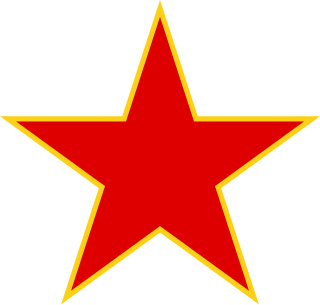
League of Communists – Movement for Yugoslavia was a political party formed by members of the Yugoslav People's Army in 1990 active in Serbia. The party was based on former party organizations within the army. In 1994 it joined the Yugoslav Left party led by Mirjana Marković.

Milorad Ekmečić was a Yugoslav and Serbian historian. During World War II he became a member of the Yugoslav Partisans after the fascist Ustaše perpetrated the Prebilovci massacre, in which 78 members of his family were killed, including his father. He studied at the University of Zagreb and went on to be a professor at the University of Sarajevo, and later at the University of Belgrade. He was a member of several Yugoslav academies of sciences and arts, the author of more than a dozen historical books, and received several significant national awards. Ekmečić authored several important works in socialist Yugoslavia, including his contribution to the acclaimed History of Yugoslavia published in English in 1974, and Stvaranje Jugoslavije 1790–1918 [Creation of Yugoslavia 1790–1918] in 1989.
The League of Socialist Youth of Bosnia and Herzegovina was a youth organization in the Socialist Republic of Bosnia and Herzegovina. SSOBiH traced its roots to the youth resistance movements during World War II, and became the main youth organization in the republic during the Tito era. During the 1980s, SSOBiH became increasingly autonomous from the party line and eventually became a political party of its own. It was succeeded by the Liberal Democratic Party.

The Secretary of the Central Committee of the League of Communists of Croatia was the head of the League of Communists of Croatia, heading the Central Committee of the Party. The holder of the office was, for a significant period, the de facto most influential politician in the Socialist Republic of Croatia, a constituent republic of Yugoslavia. The official name of the office was changed in May 1982 from "Secretary of the Central Committee" to President of the Presidency of the Central Committee of the League of Communists of Croatia.
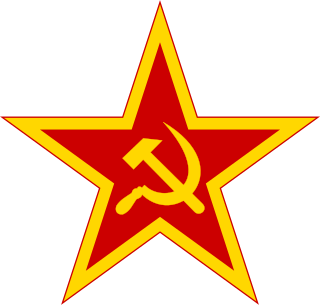
The Secretary of the Provincial Committee of the League of Communists of Vojvodina was the head of the League of Communists of Vojvodina, heading the Provincial Committee of the Party. The holder of the office was, for a significant period, the de facto most influential politician in the Socialist Autonomous Province of Vojvodina, an autonomous province of Serbia within Yugoslavia. The official name of the office was changed in April 1982 from "Secretary of the Provincial Committee" to President of the Presidency of the Provincial Committee of the League of Communists of Vojvodina.

The President of the Central Committee of the League of Communists of Montenegro was the head of the League of Communists of Montenegro, heading the Central Committee of the Party.

The Secretary of the Central Committee of the League of Communists of Bosnia and Herzegovina was the head of the League of Communists of Bosnia and Herzegovina, heading the Central Committee of the Party. The holder of the office was, for a significant period, the de facto most influential politician in the Socialist Republic of Bosnia and Herzegovina, a constituent republic of Yugoslavia. The official name of the office was changed in May 1982 from "Secretary of the Central Committee" to President of the Presidency of the Central Committee of the League of Communists of Bosnia and Herzegovina.
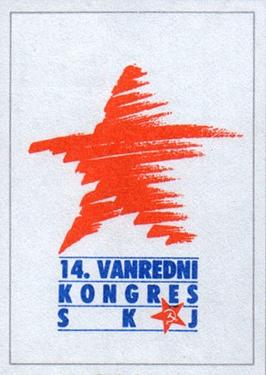
The 14th (Extraordinary) Congress of the League of Communists of Yugoslavia was held from 20 to 22 January 1990, in the Belgrade Sava Centar. The highest organ of both the government and the party, it was the last Congress of the League of Communists of Yugoslavia. It was attended by delegates from all the republics and provinces, as well as a party delegation from the Yugoslav People's Army. The meeting was chaired by President of the Presidency of the Central Committee Milan Pančevski from Macedonia.
A Central Committee of the League of Communists of Yugoslavia was elected by the 11th Congress, and was in session from 1978 until 1982. The committee had 20 members from each of the six individual republics, and 15 members from each of the two autonomous provinces and the Yugoslav People's Army.

The 5th Congress of the Communist Party of Yugoslavia was held from 21 to 28 July 1948, in the House of the Guard in Topčider, Belgrade. The Congress was attended by 2,344 delegates out of the 468,175 members of the Communist Party of Yugoslavia.

The Communist Party of Yugoslavia held its sixth congress in Zagreb on 2–7 November 1952. It was attended by 2,022 delegates representing 779,382 party members. The sixth congress sought to discuss new policies, first of all in reaction to the Yugoslav–Soviet split and Yugoslav rapprochement with the United States. The congress is considered the peak of liberalisation of Yugoslav political life in the 1950s. The congress also renamed the party the League of Communists of Yugoslavia.
The 12th Congress of the League of Communists of Yugoslavia was held from 26 to 29 June 1982, in the Belgrade Sava Centar. The highest organ of both the government and the party, it was the first Congress of League of Communists of Yugoslavia convened since Josip Broz Tito's death in 1980. It was attended by delegates from all the republics and provinces, as well as a party delegation from the Yugoslav People's Army.














